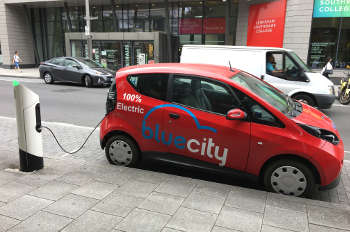Having given an informative talk to the ADEPT conference, Marcus Stewart, head of energy insights at the National Grid, spoke exclusively to Transport Network about the future of electric vehicle charging.
We have heard some talk of councils considering selling a commission to energy companies to earn revenue from giving them exclusive rights to local electric vehicle charging. Is this something you are involved in?
I have not heard about it. I guess when you think about charging infrastructure you have the physical asset, the connection to the network and where the energy is going to come from so if the local authority wants to manage or own that you have to bring all those pieces together so finding an intermediary or a partner is probably an easy way of doing it.
In Hounslow they have introduced charging from streetlights. What is you take on that?

Our view is what we call the mosaic of charging. We expect home charging to be the early adopters because of the convenience factor - 43% of homes don’t have access to off street charging and there is a number of solutions that could deliver that. Lampposts is one. I am aware of a number of trials. There is also where people leave their car - what we call destination charging, such as work places, out of town supermarkets, cinemas, train stations. They are likely to be part of the solution.
We think we see a need for fast charging on major infrastructure routes such as major A roads as well. It would still be plug-in. A motorway service station will have 10 -15 pumps so you can imagine 10 plug-in charging spots, that kind of capacity, where you would have fast charging. We, and I know the Government too, see that as an enabler to deal with range anxiety in particular, which is one of the perceived barriers. Once you own a car your perception changes but it is getting people in the car.
Have you done any work on eletric vehicle charging around motorways?
I was asked by government about how our Natioonal Grid network maps with the motorway network. They see that as a strategic option that is relatively low cost in the grand scheme of things and we have done some work on that and shared our thoughts. At the moment we don’t have funding to do anything with it.
The findings were that a good proportion of motorway service stations are close enough to ourinfrastructure to make it a credible place to connect and therefore are likely to be a good place to start.
Government is certainly very interested in that and see it as one potential route to roll out charging. They have given money to roll out charging in the Budget. How that might be spent I don’t know but some of that could at least do some pilot projects in that area I would imagine. We don’t have any projects ready to go. I stress at the moment it is all conceptual but that could be one neat solution.
What is your take on highway conductive or inductive charging as opposed to plug-in charging?
It's not something that I am aware we are looking at directly. If you were to do conduction charging it would be through a local DNO (distribution network operator). Think of the National Grid as motorways and DNO as the local road network. Again it's a third party type infrastructure. It's a chicken and egg. Are the manufacturers going to go with it? What is the cost-benefit compared to plug-in?
Electric vehicles can be a source of energy as well can't they?
That's right. It's called vehicle-to-grid. An electric car is basically a battery on wheels, so they have the potential to charge up energy and use it to drive and if you don’t want to drive anywhere that energy could be fed back into your house or back into the network to offset demand.
There are a couple of pilot projects going on around that. We are involved in a few projects with funding through Innovate UK. We are looking at a few projects, asking, what does it mean for the network? We are considering how it affects the stability and various technical elements and understanding behaviour.
What do you want from the eletric vehicle charging system?
At the moment there could be electric vehicles increasing demand at peak, but if a car is plugged back in it could in theory generate electricity at peak and contribute to a more efficient energy system and the driver could earn revenue from that. You pay more in the day and less at night. So if you charge your car at night, you can sell that back during the day.
The system would get a benefit as you would not need as much power. The system likes it because you are optimising the use of the asset so you don’t need to run as much generation. The last bit of generation is most expensive for everyone.
The consumer is going to become much more integrated with the energy system and it will be flowing both ways. It's not just solar panels that will push in energy into the system; your car could do that too.
We have to get over some hurdles around the technology. I believe it will happen, but then it comes back to whether it has the economic case, whether it is worth it for the consumer. The system you need to put energy back into the grid is more complicated than just taking a charge.
It depends on the right data and the right price to the customer. There are lots of things to be worked through but it has potential, definitely.





